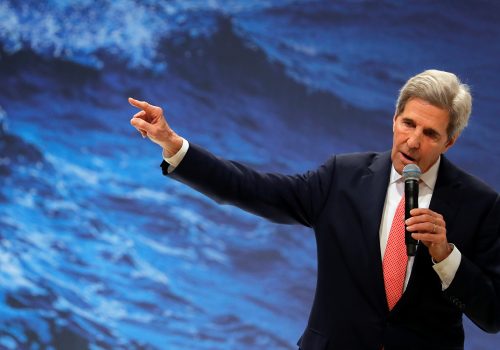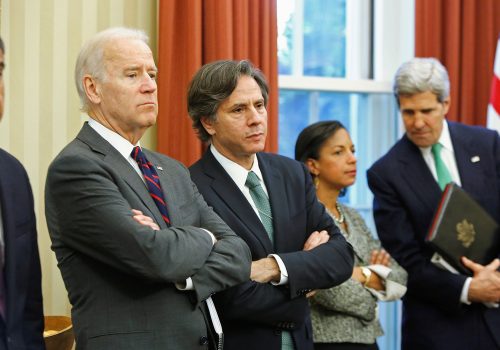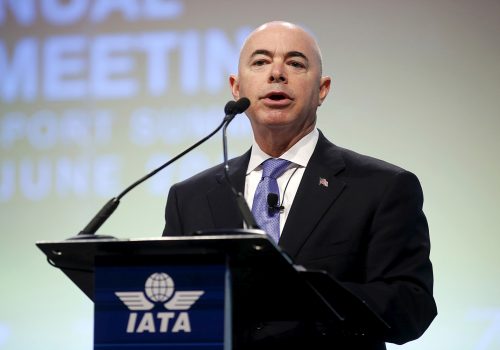FAST THINKING: Biden’s surprise pick for defense secretary
JUST IN
The biggest surprise of the Biden transition so far is here: The president-elect has reportedly picked retired general Lloyd Austin as his nominee for secretary of defense. If confirmed, Austin would become the first African American to lead the nation’s armed forces. But that’s a real “if”—he only left his post as head of US Central Command in 2016. That means he’d need a congressional waiver, since a soldier is required by law to be retired for seven years before assuming the civilian post. Is he the right person for the job? And what does the historic selection mean?
TODAY’S EXPERT REACTION COURTESY OF
- Chris Skaluba: Former senior Defense Department official and director of the Scowcroft Center’s Transatlantic Security Initiative
- Marc Sievers: Former US ambassador and Atlantic Council senior fellow with the Middle East programs
- Leah Scheunemann: Former Defense Department official and associate director of the Transatlantic Security Initiative
- Chris Preble: Co-director of the Scowcroft Center’s New American Engagement Initiative
On civilian control of the military
- The Austin pick is “groundbreaking,” Chris S. tells us, “and something to be celebrated. He is an undeniably qualified and well-regarded leader who already has the respect of the uniformed military, the department’s civilian staff, and Congress. With forty years in uniform, he has lived the military experience from just about every conceivable perspective, giving him a unique credibility that few defense secretaries bring to the job.”
- At the same time, Chris S. says, the selection raises “a number of serious questions”—Austin’s recent departure from the military chief among them. The waiting period is designed to preserve civilian control of the military. This issue arose four years ago, when Donald Trump nominated Jim Mattis, Austin’s predecessor at Centcom. Congress granted Mattis a waiver in what some argued were extraordinary circumstances.
- Chris S. notes that much of the national-security community now sees that decision to make an exception for Mattis as “a mistake.” His ascent—along with two more retired generals in H.R. McMaster, Trump’s national security advisor, and John Kelly, his chief of staff—“is seen to have overtly politicized the military and undermined the principle of civilian control.”
- This was exacerbated, Chris S. adds, by the decisions of Mattis and his successors to staff their offices with former military brass, which “upset the balance between the department’s civilian and military staffs. That Biden is dismissing these concerns after the controversial tenure of Mattis is notable.”
An up-close view of Austin
- Marc was a senior diplomat at the US embassy in Baghdad in late 2010, when Austin took command of US forces in Iraq during a particularly fraught time. The previous commander had clashed with the previous US ambassador, sinking relations between the embassy and the military. Austin and the new ambassador, James Jeffrey, worked quickly to mend the ties “to everyone’s great relief,” Marc recalls.
- There were still 150,000 US troops in Iraq at the time, and Austin faced a difficult local political situation as the US sought a role for a rival of Prime Minister Nuri al-Maliki in a coalition government Maliki was forming. Austin addressed this, Marc says, by working “hand in glove” with US diplomats to ensure it was clear to Iraqi leaders “that we spoke with one voice.” With an eye to the Obama administration’s plans to eventually draw down troops, meanwhile, Austin worked simultaneously to pave the way for the State Department to take on a greater share of the US role in Iraq: “Austin’s management of such a high-stakes civilian-military transition bodes well for his success as secretary of defense, should he be confirmed.”
Looking back versus looking ahead
- Leah notes that Austin’s record is centered on the American wars of the last two decades. He played key roles in Iraq and Afghanistan and led Centcom early in the counter-ISIS fight. This gives him valuable experience with coalition partners, she says. But “it’s unclear where he will be on policy issues outside of counterterrorism and how deep his background is on areas beyond Syria, Iraq, and the Middle East.”
- She worries that his Centcom experience “will lead to overemphasis on the Middle East at a time where the military as a whole needs to modernize and align for ongoing competition with China (and Russia secondly).”
- “I expect the Biden administration will continue to prioritize the threat of China overall, which has military elements now including modernization and readiness, and neither aim is best served by focusing too much on the Middle East,” Leah adds.
Lingering questions on how the nomination process played out
- Until recently, Michele Flournoy, an undersecretary of defense in the Obama administration, was considered the frontrunner for the nomination. She reportedly faced resistance from progressive groups over business ties to the defense industry. Austin has served on the board of Raytheon, raising similar issues. “Even in celebrating Austin’s historic nomination, supporters of Michele Flournoy—both women and men—are disillusioned by the inability to shatter the Pentagon’s notorious glass ceiling and disturbed by a double standard that saw Flournoy scrutinized for warmongering and ties to defense industry that other Biden cabinet selections were spared,” Chris S. says.
- Chris P., meanwhile, hopes the extra scrutiny around the issue of defense-industry ties will prove useful. “Transparency should be the standard,” he says. “In an era when faith in institutions is at an all-time low, individuals serving in government have an obligation to demonstrate the very highest ethical standards.”
- A key task for the new defense secretary, Chris P. tells us, will be finding a way to roll back military spending, which spiked under Trump. The need for this “has never been more urgent,” he says. “Trillions of dollars spent to build and maintain the world’s most capable military was irrelevant in the fight against COVID-19. The United States’ global influence is not measured simply by the number of US troops.”
Further reading
Tue, Nov 24, 2020
FAST THINKING: John Kerry, America’s first climate czar
Fast Thinking By
It’s one thing to say you take the threat of climate change seriously. It’s another to create a new cabinet-level post for a “climate envoy,” give it to John Kerry, and save him a seat on your National Security Council. That’s the plan Joe Biden laid out this week. What difference will it make?
Mon, Nov 23, 2020
FAST THINKING: How Tony Blinken sees America
Fast Thinking By
Joe Biden is reportedly about to make his first major foreign-policy move by announcing that he’ll nominate Tony Blinken, his longtime advisor and a veteran of the Clinton and Obama administrations, as secretary of state. To answer the big questions about who Blinken is and how he might serve in the role, we turned to Dan Fried, a former US ambassador who spent forty years in the foreign service and has known Blinken for decades.
Mon, Nov 23, 2020
FAST THINKING: Meet the picks for Biden’s national security team
Fast Thinking By
Joe Biden’s selections for his incoming national security team are coming in fast. But what’s the bigger picture that’s coming into focus?
Image: Photo by Takaaki Iwabu/Raleigh New Observer/TNS/ABACAPRESS.COM


